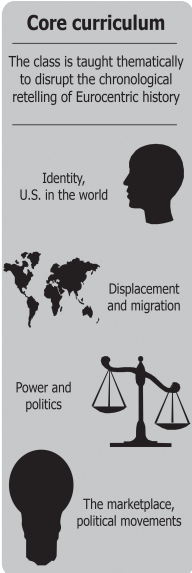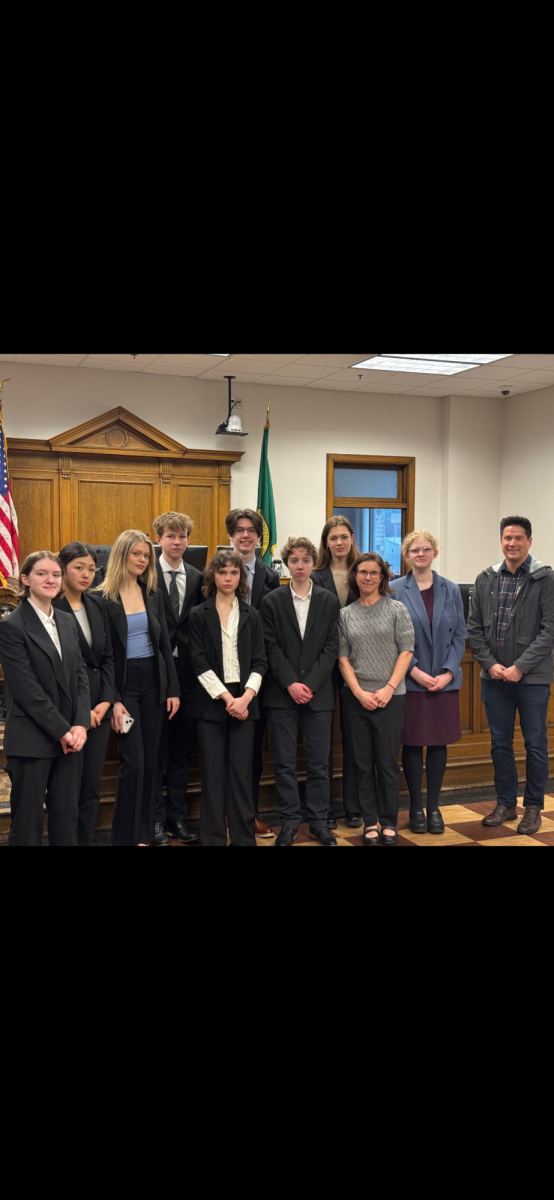Centering marginalized people’s stories in the classroom
Dhani Srinivasan, Opinions editor
ORIGINALLY PUBLISHED January 24, 2019
In response to a growing demand for ethnic studies curriculum within our district, this school year a handful of teachers have piloted a decolonized U.S. history course. The class moves away from the “mainstream” method of teaching U.S. history through a White colonial lens and instead focuses on the representation of marginalized people’s stories.
Over the summer, history teacher Robin Dowdy attended a two week ethnic studies program offered to Seattle Public Schools teachers. She, along with fellow history teachers Kyle Morean and Shawn Lee, paired this training with curriculum piloted by the Bellevue district in the 2018-2019 school year to form the decolonized U.S. history course.
“It’s kind of the obvious time to do this where there’s a lot of political unrest and activism amongst young people in particular,” Morean said.
Although the course does not rest on the frameworks of ethnic studies, the decolonized U.S. history curriculum is a step towards centering marginalized voices in the classroom. Currently, only a very small group of schools in the district offer a class on ethnic studies as it has not been made a requirement by the district.
“Over the past decade, social studies departments, curriculum providers and teachers have been trying to improve the representation of who is in the books, who is in the curriculum and who we talk about,” Dowdy said.
Dowdy says it has been a little awkward for some students to move away from a White-centered history course especially in a predominantly White school.
“Usually [the course] defines what American history is and this is how different groups have experienced it,” Dowdy said. “Now, we are not doing this is what [American history] is, but just highlighting different experiences.”
Thematic history
The new curriculum delves into historical themes rather than a chronological succession of history. Bellevue’s curriculum offered units on identity, displacement and migration, power and politics, the marketplace, resistance or U.S. in the world and global values. Dowdy, Morean and Lee later added in units on media literacy to help students with research skills and democratic elections to go along with the school’s mock election.
Thematic teaching acts as a disruption to the typical retelling of chronological White history by delving into the stories of marginalized people. Additionally, for SPS student’s, it disrupts concepts that were repeatedly ingrained in them in other years.
“There’s a flaw in the design of U.S. history in terms of the major stories that we reiterate in 5th grade and then again in 8th grade,” Morean said. “Getting to challenge the master narrative and stories of what American success looks like, who we should applaud and what values are American.”
However, many students have felt unmoored by not learning in the chronological fashion that is typical in history classes.
“I did have one student ask me, ‘what are we missing out on?’” Dowdy said. “We need to do a better job of getting students to understand that this is U.S. history. This isn’t the study of a special group of people. Every single one of these people were Americans and this is the history of how the United States has acted.”
Into the curriculum
Walking into Ms. Dowdy or Mr. Morean’s classroom, one can see that the walls are lined with diagrams of individual student’s identity.
“All the work that we did around identity at the beginning of the school year was a huge way to entreat students that they have history and that they have perspective,” Morean said. “A big part of learning to expand the narrative and the influence of history is validating individual stories. So that was a great way to get students to consider history differently.”
From the starting point of identity, students learned to unpack overarching concepts of the master narrative and dominant stories that they have been told. For instance, in a content retainment lecture students pulled apart examples of conventional U.S. history in order to put into conversation values like capitalism vs. communism.
Interdisciplinary perspectives
This year, the staff formed teams to create equity action plans to bring new ideas into practice within the school. The team that Dowdy is on includes teachers across different subjects to address ethnic studies and challenge the master narrative beyond history classrooms.
“There’s a district somewhere in the country where they are piloting a science curriculum based on race,” Dowdy said. “Some science teachers are worried about it but others say if you’re not talking about it then you are pretending that race is [biologically] real when it’s really a social construct.”
Teachers on the team have been committed to the idea of expanding critical lenses in interdisciplinary subject matter. Dowdy noted that several math teachers have been challenging the idea of who higher math benefits and who it leaves out.
Ultimately, the decolonized U.S. history course offers great motivation to those teaching it this year. “I just got such a glossed over version of U.S. history when I was your age” said Morean. “I’m just trying to make up for lost time a little bit.
“My high school history teachers were coaches that needed a day job so I’m continually trying to do better and do by young people that can and will be motivated by our country’s history the good the bad and the ugly.”

























